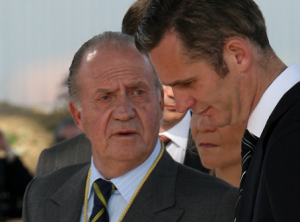
Who says the Christmas period is boring for news? Right now, Spain has three judicial investigations or court cases involving intrigue, royalty and expensive suits.
The trial of the Popular Party’s Valencia boss Francisco Camps for allegedly taking sartorial kick-backs in return for granting favours to private sector cronies is probably the most “normal” of this trio of cases. It seems to be a clear-cut case of did-he-or-didn’t-he, involving a senior politician and a shady character with an enormous moustache aptly known as Bigotes.
More complex is the case against Baltasar Garzón, Spain’s best-known celebrity judge. The man who wanted to put Osama Bin Laden on trial will soon be in court himself for having wiretapped conversations between lawyers and suspects jailed for their part in the same Gürtel corruption ring that Camps is implicated in. He also faces probes related to his failed pursuit of Franco-era war criminals and his finances during a stay in New York.
Flashy suits aside, neither case is that surprising, given the circumstances. The Gürtel corruption seems to have been a malignant consequence of Spain’s dizzy economic bonanza. The country’s heavily decentralised state structure and a lack of checks and balances made these crimes if not inevitable, then highly tempting for unscrupulous politicians. More bewildering is how the justice system has been quicker to put on trial a magistrate investigating the case than many of those who were actually involved. Cynics explain that by pointing to the deeply politicised nature of the judiciary and how the hyperactive Garzón has built up a legion of powerful enemies within it.
But an affair that has been more surprising, and dare I say it refreshing, than these two is that of Iñaki Urdangarin, King Juan Carlos’s son-in-law, the former chairman of a charity being investigated for embezzlement.
As things stand, it doesn’t look good for the husband of the Infanta Cristina, a devilishly handsome former professional handball player. He hasn’t been charged with any crime, but the Noos Institute that he oversaw reportedly misdirected millions in public funds, and reportedly he could be charged in the coming weeks.
If true, this is all pretty damning for Urdangarin. But amid all the dirt, I find something positive about this scandal. That’s partly because the Spanish press, which is traditionally so diffident regarding the monarchy, has got really stuck in. Even the right-wing El Mundo has given blow-by-blow accounts of Urdangarin’s undoing. A press that is so clearly divided in its political affiliation and which alters its focus on corruption stories depending on which party is affected, has been able to forget all that as it reports on that true novelty, a Spanish royal scandal.
There has always been a feeling that Juan Carlos and his family are untouchable, however down-to-earth they may appear, and that the king’s Transition-era heroics of the seventies and eighties earned him never-ending credit. But if the king’s son-in-law turns out not to be above the law, Spain’s often ridiculed judiciary will have gained some respect.
And strangely, the royal family itself does come out of this affair with some credit – at least compared to the political and judicial institutions involved in the Gürtel case. Where the Popular Party leadership buried its head in the sand as its politicians were repeatedly implicated in the kickbacks scandal, the royal household has acted decisively, removing the Washington-based Urdangarin from his royal duties. It has also taken the canny but correct step of announcing it will reveal details of its financial accounts.
I wouldn’t go as far as to say Urdangarin-gate is good for Spain – the millions in the jobless line surely wouldn’t think so. But for once, a corruption scandal is reflecting relatively well on the media, those investigating and ironically, the institution affected.
Now that’s quite an angle! The Zarzuela gone Buckingham, with a positive twist.
This text is fresh air, hopefully they read it in Spain too.
We do in fact read it in Spain, I’m actually reading it from Valencia. Funny remark on the “Bigotes” part.
Quite accurate and well-informed, congrats on it Mr. Hedgecoe.